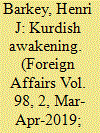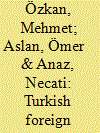| Srl | Item |
| 1 |
ID:
163311


|
|
|
|
|
| Summary/Abstract |
We’ve been fighting for a long time in Syria,” said U.S. President Donald Trump in the last days of 2018. “Now it’s time for our troops to come back home.” The president’s surprise call for a rapid withdrawal of the nearly 2,000 U.S. troops stationed in Syria drew widespread criticism from members of the U.S. foreign policy establishment. But it came as an even greater shock to the United States’ main partner in the fight against the Islamic State (or ISIS), the Syrian Kurds. For weeks prior to the announcement, Turkish President Recep Tayyip Erdogan had been threatening to invade areas of northern Syria controlled by Kurdish militants. The only thing stopping him was the presence of U.S. troops. Removing them would leave the Kurds deeply exposed. “If [the Americans] will leave,” warned one Syrian Kurd, “we will curse them as traitors.”
|
|
|
|
|
|
|
|
|
|
|
|
|
|
|
|
| 2 |
ID:
149425


|
|
|
|
|
| Summary/Abstract |
This article is an attempt to answer a number of questions asked in the literature on radicalization and extremism: What motivates foreign terrorist fighters (FTFs) from Turkey to join the Islamic State of Iraq and Syria (ISIS)? In what kind of environment does violent extremism become the choice for Turkish nationals to join ISIS in Syria and Iraq? How can Turkish nationals who join ISIS be profiled in terms of their socio-economic and cultural traits and how do these traits compare people from other nations who join and fight in terrorist organizations? Though their numbers remained minimal compared to the overall population, how can we explain the case of Turkish FTFs, when a peaceful and tolerant ‘Anatolian/Sufi Islam’ has reigned in the country and Muslims are well integrated in the social, economic, and political life of the country under the 13-year long rule of Islamic-oriented Justice and Development Party (AK Party)? What do these answers to these questions mean for Turkish Islam and possible de-radicalization programs? These questions will be addressed by semi-structured interviews conducted both with Turkish FTFs who have joined ISIS and with family members of some of those who have returned from fighting with ISIS.
|
|
|
|
|
|
|
|
|
|
|
|
|
|
|
|